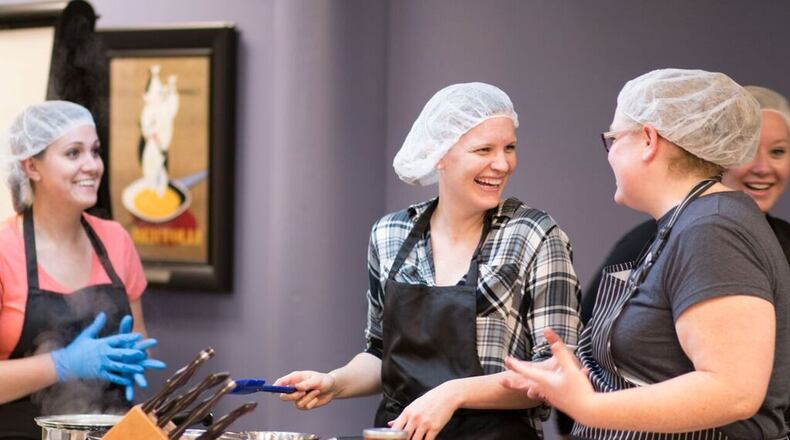››RELATED: Local Muslim youth group does outreach
The program brings together primary care residents from Grandview and undergraduate dietetics students from UD. They get hands-on training, preparing nutritious meals in the University’s ProduceOne Food & Nutrition Laboratory.
“Since starting my practice in family medicine 15 years ago, I have seen a big change in the overall health of people and recognized that it is in large part due to poor dietary and lifestyle choices,” said Josephine Elrod, a doctor affiliated with Grandview Medical Center. “Physicians spend the majority of medical school learning disease processes, etiology, and pharmacology, but very little about how to incorporate food and lifestyle changes into the prevention and treatment of disease and how to relay this information to patients.”
Elrod practices what she preaches by following a Mediterranean diet with at least two servings of vegetables, one fruit, and a healthy protein like salmon at dinner.
At a recent class, modified versions of a traditional pasta and meat sauce dinner were demonstrated. The recommendations were less beef and more vegetables with whole grain pasta, or added legumes and veggies with less beef. There was also a vegan option with legumes, vegetables, tomato sauce and gluten-free pasta.
Each session of this program examines a case study related to a disease such as hypertension, obesity, and diabetes, and diet choices that affect it. Classes also address issues faced by patients that lead to poor food choices, such as having limited time, money, or access to healthy food in Dayton’s food desert.
“The goal is to help physicians understand the changes their patients are being asked to make when they have to adopt a new lifestyle to improve health outcomes,” said Jennifer Dalton, director of the UD didactic program in dietetics. “This is the perfect partnership between the dietetic profession and medical profession to harness our strengths to benefit patient outcomes.”
As a registered dietitian nutritionist, Dalton listed several ways a person could improve their overall health with diet.
1. Include a variety of foods in your diet, being mindful to include balance from all food groups. 2. Work toward including fiber and nutrient-rich foods such as whole grains, fresh fruits and vegetables, as these foods can help us feel full and satisfied. 3. Obtain a variety of protein sources. Choose lean beef once a week, chicken once a week, fish once or twice a week, and the rest of the week eat vegetarian meals. 4. Take time to be fully present at the meal, chew slowly and enjoy the flavors and textures of your food.
At home, Dalton likes to create meal bowls. Her current favorite is a spicy cashew broccoli bowl. It’s made with fresh broccoli, green onions, cashews, chili pepper flakes, gluten-free soy sauce and a protein such as salmon, tofu or chicken fried in sesame oil. It can be eaten alone or served over rice or pasta.
A new module is planned for the culinary medicine program about increasing amounts of antioxidants in the diet.
“Dietary antioxidants may be beneficial in preventing and treating conditions such as cardiovascular disease, cancer and Alzheimer’s disease,” said Dalton.
The culinary medicine program is funded by Grandview Hospital Foundation. It’s modeled after Tulane University’s teaching kitchen, the first of its kind at a medical school.
“We are excited to be the leaders in Ohio and the Midwest,” Elrod said.
Contact this contributing writer at PamDillon@woh.rr.com.
About the Author
